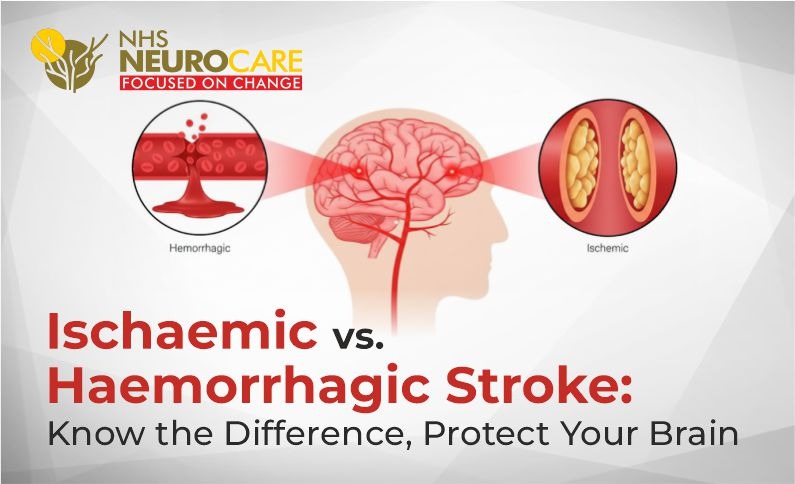A stroke is one of the most serious medical emergencies, and recognising its nature is vital for timely treatment. Every minute counts when it comes to saving brain cells, preventing long-term disability, and protecting quality of life. At NHS Neurocare (a unit of NHS Hospital), patients have access to advanced facilities including a special Stroke ICU and Stroke Unit, supported by cutting-edge technology and expert care. Led by Dr Sandeep Goel, who has over 25 years of experience treating stroke patients, our team provides world-class treatment to people from across the region, including those seeking the best neurologist for Kapurthala people.
What is a Stroke?
A stroke occurs when blood supply to part of the brain is interrupted or reduced, depriving brain tissue of oxygen and nutrients. Without immediate intervention, brain cells begin to die within minutes. Strokes are broadly classified into two main types: ischaemic stroke and haemorrhagic stroke. Understanding the difference is essential, as each requires a very different approach to treatment.
Ischaemic Stroke: The Most Common Type
Ischaemic strokes account for nearly 80% of all cases. They occur when a blood clot blocks or narrows an artery leading to the brain. These clots may form in the arteries of the brain itself or travel from another part of the body, such as the heart.
Causes and Risk Factors
- Atherosclerosis (narrowing of arteries due to fatty deposits)
- High blood pressure
- Irregular heartbeat (atrial fibrillation)
- Diabetes
- High cholesterol levels
Symptoms
- Sudden weakness or numbness in the face, arm, or leg (often on one side)
- Difficulty speaking or understanding speech
- Vision problems in one or both eyes
- Loss of balance or coordination
Treatment at NHS Neurocare
At NHS Neurocare, rapid diagnosis and intervention are central to our approach. Patients may be treated with clot-dissolving medication (thrombolysis) or advanced procedures such as mechanical thrombectomy. Our 3D Cath Lab and cutting-edge technology allow our team to precisely identify blockages and deliver life-saving care with accuracy.
Haemorrhagic Stroke: When Blood Vessels Burst
Haemorrhagic strokes account for about 20% of cases and occur when a weakened blood vessel in the brain ruptures, causing bleeding into or around the brain tissue. This bleeding puts pressure on surrounding brain cells, damaging them and disrupting their function.
Causes and Risk Factors
- Uncontrolled high blood pressure
- Brain aneurysms
- Blood-thinning medications
- Trauma or head injury
Symptoms
- Sudden, severe headache often described as “the worst ever”
- Nausea and vomiting
- Sudden loss of consciousness
- Seizures
- Weakness or numbness similar to ischaemic stroke symptoms
Treatment at NHS Neurocare
Haemorrhagic strokes are managed differently from ischaemic strokes. Treatment may involve controlling bleeding, reducing brain pressure, and, in some cases, surgical intervention. At NHS Neurocare, our special Stroke ICU and Stroke Unit are fully equipped to handle such emergencies, ensuring patients receive immediate and appropriate care.
Why Rapid Diagnosis Matters
The critical difference between the two types of stroke is that the wrong treatment can make matters worse. For example, clot-busting drugs given to a haemorrhagic stroke patient could increase bleeding. This is why quick access to expert neurologists and advanced imaging is vital.
At NHS Neurocare in Jalandhar, patients benefit from cutting-edge diagnostic tools and the expertise of Dr Sandeep Goel, widely recognised as one of the region’s leading stroke specialists with more than two decades of experience. Patients from neighbouring areas, including Kapurthala, often seek his care, trusting him as the best neurologist for Kapurthala people.
Rehabilitation and Recovery
Stroke recovery does not end after emergency treatment. Rehabilitation is essential to help patients regain independence and improve quality of life. This may include physiotherapy, speech therapy, and occupational therapy. At NHS Neurocare, we provide a comprehensive recovery plan tailored to each patient, supported by our dedicated rehabilitation specialists.
Why Choose NHS Neurocare for Stroke Care?
- Special Stroke ICU and Stroke Unit for 24/7 emergency management
- 3D Cath Lab and advanced imaging for precise diagnosis and treatment
- Dr Sandeep Goel, with 25+ years of experience in treating stroke patients
- Cutting-edge technology ensuring international-standard care
- Trusted choice for patients from Jalandhar, Kapurthala, and across Punjab
Conclusion
Both ischaemic and haemorrhagic strokes are life-threatening, but with immediate treatment and expert care, survival and recovery outcomes improve significantly. Recognising symptoms early, calling for help without delay, and choosing a trusted centre for stroke care can make all the difference.
At NHS Neurocare (a unit of NHS Hospital), patients receive comprehensive stroke care—from emergency treatment to rehabilitation—in a facility that blends expertise, technology, and compassion. If you or a loved one experiences signs of a stroke, remember: every second counts. Seek help immediately and trust the specialists who deliver excellence in stroke management every day.

